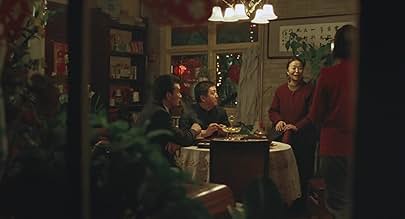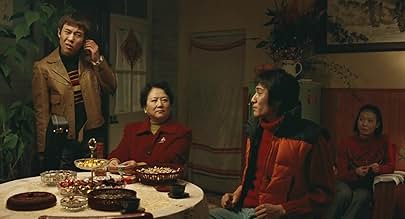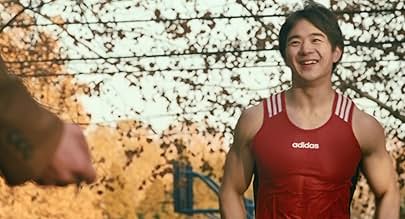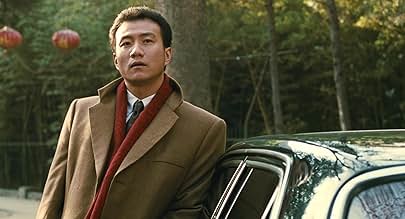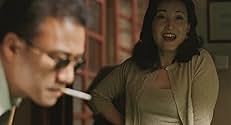IMDb RATING
7.2/10
3.3K
YOUR RATING
A young gay student has a relationship with an older successful businessman. The handsome playboy-businessman must choose between his comfortable, yet straight, life or an honest, yet subver... Read allA young gay student has a relationship with an older successful businessman. The handsome playboy-businessman must choose between his comfortable, yet straight, life or an honest, yet subversive, life with the student.A young gay student has a relationship with an older successful businessman. The handsome playboy-businessman must choose between his comfortable, yet straight, life or an honest, yet subversive, life with the student.
- Director
- Writers
- Stars
- Awards
- 14 wins & 26 nominations total
- Director
- Writers
- All cast & crew
- Production, box office & more at IMDbPro
Featured reviews
Generally I'm not a big fan of melodrama, and LAN YU is a classic, Sirk-league piece of melodrama, so I can't say I loved this film. But it is impressive in a number of ways - the depiction of intimacy, and of a slowly-developing relationship is very well done, and this film is very obviously the work of a thoughtful and talented filmmaker. I also liked the cinematography - very un-flashy, which serves the material well: a dry, slice-of-life look which stands apart from the dramatics of the plot, and definitely underscores the normality (or validity) of gay relationships, perhaps in a culture that is still coming to terms with such relationships. The dinner scenes - which are beautifully shot and staged - stand out.
It should be noted that director Stanley Kwan has a handful of other artistically notable films to his credit, with ROUGE and ACTRESS generating acclaim around the globe. Kwan claims Hollywood melodramatist Douglas Sirk and Japanese contemporary dramatist Yasujiro Ozu as major influences, and both of those influences are apparent here - the studied, careful mis-en-scene of Ozu; and a story balanced between social critique and three-hanky melodrama, in the fashion of Sirk. Kwan is also one of a small (but growing) number of out Asian filmmakers, and noting this (and his artistic influences) helps to understand the overall importance of this film.
If some of the most creative and engaging gay film being made today is coming from Asia, Europe and Latin America - which I believe to be true - then this film is definitely among the best of that wave. Worth a look.
It should be noted that director Stanley Kwan has a handful of other artistically notable films to his credit, with ROUGE and ACTRESS generating acclaim around the globe. Kwan claims Hollywood melodramatist Douglas Sirk and Japanese contemporary dramatist Yasujiro Ozu as major influences, and both of those influences are apparent here - the studied, careful mis-en-scene of Ozu; and a story balanced between social critique and three-hanky melodrama, in the fashion of Sirk. Kwan is also one of a small (but growing) number of out Asian filmmakers, and noting this (and his artistic influences) helps to understand the overall importance of this film.
If some of the most creative and engaging gay film being made today is coming from Asia, Europe and Latin America - which I believe to be true - then this film is definitely among the best of that wave. Worth a look.
It has an overall feel of an Eric Rohmer film, the portrayal of the reality of emotion and connection in the stark environment of modern Beijing and Chinese society is a feat of amazing subtlety.
Perhaps incomprehensible to people in a society long open, the stark contrast between the comfort of rare privilege and emotional squalor and the material squalor of the young student/architect and emotional richness there goes beyond the triteness the another user accuses this material of.
I am fairly jaded westerner moved to emotional resonance, (certainly not the result of the melodramatic ending I could have done without.)
Perhaps incomprehensible to people in a society long open, the stark contrast between the comfort of rare privilege and emotional squalor and the material squalor of the young student/architect and emotional richness there goes beyond the triteness the another user accuses this material of.
I am fairly jaded westerner moved to emotional resonance, (certainly not the result of the melodramatic ending I could have done without.)
I cried while watching it, and I don't know if I was crying about my life or the movie. "Rainbow Shy and Afraid to be on Camera" kept feeling like it was a bad ending, and near the end thought it was a happy ending, but it almost can be seen as a good ending. The square was mentioned over and over again and I kept wondering if it was really just a romance movie.
LAN YU is another indication that films from China are becoming increasingly more poignant, less dependent on spectacle, and certainly more daring in view of the political milieu. Director Stanley Kwan not only has courage to make this poignant film, he also has the gifts to create an atmospheric, gentle, quiet, and luminously photographed love story. He draws understated performances from his actors, never stooping to caricature, always respectful of the inherent delicacy of his subject matter. Lan Yu is a handsome young gay architecture student who becomes involved with Hangdong, a closeted Beijing businessman. The affair they pursue is subtle yet not without passion, the kind of understated passion that rings true rather than playing for sensationalism. The plot twists and turns - Lan Yu is set aside by Hangdong for a "proper marriage" which leads to divorce and to other losses, bringing Hangdong back to seek his real love - Lan Yu. The change in their relationship speaks loudly for a wider acceptance of same sex love. To reveal the ending would be a disservice to the viewer. Part of the joy of this simple story is the sensitivity of Hangdong's colleagues in responding to the his various dilemmas: there is no "bad guy", no prejudice, no castigation - these friends are committed and make homophobia seem merely a foreign, unimportant word. This film is a model of restraint and intelligent, finely crafted story telling. The actors are uniformly excellent and win our hearts. Highly Recommended!
Basically, this is the story about a well-to-do Beijing businessman with questionable business principles who enjoys the company of young male students whom he treats as his play thing and pays them for their sexual participation.
Lan Yu a somewhat shy architectural student attending a University in Beijing is enticed into the businessman's home where he is subsequently seduced.
In the ensuing months the relationship deepens and they become lovers meeting at every opportunity. The emotions are subtly portrayed by the two actors. We hang on every word spoken and get caught up in their feelings. "We must never become too close", says the businessman. "It is right and proper for a man to have a wife and children". Such are his thoughts....
Secretive though their relationship may be, it is never sordid. They feel so relaxed in each other's company. The tiny rooms and narrow passageways are almost claustrophobic. Note the device of photographing reflections in mirrors so often throughout the film. An interesting technique which is constantly repeated. In a mirror you see a person lying in bed. Beyond the camera you hear a door closing. You know that some one has left the room, though you do not see it. And note the frequent use of close-ups so important in emotional scenes. A hug, a kiss, a sob, a tear....so meaningful...and each emotion tugs at your heart.
Shakespeare said "Parting is such sweet sorrow". Here we have such sorrow, but then the joy of re-uniting, followed alas! by a new tragedy that parts them once more.
The final scene when the businessman stops his car at the building site and then speeds on ever so quickly with the concrete pillars flashing by is a fitting ending in itself. I think the song detracts from the mood and would be better omitted.
Lan Yu a somewhat shy architectural student attending a University in Beijing is enticed into the businessman's home where he is subsequently seduced.
In the ensuing months the relationship deepens and they become lovers meeting at every opportunity. The emotions are subtly portrayed by the two actors. We hang on every word spoken and get caught up in their feelings. "We must never become too close", says the businessman. "It is right and proper for a man to have a wife and children". Such are his thoughts....
Secretive though their relationship may be, it is never sordid. They feel so relaxed in each other's company. The tiny rooms and narrow passageways are almost claustrophobic. Note the device of photographing reflections in mirrors so often throughout the film. An interesting technique which is constantly repeated. In a mirror you see a person lying in bed. Beyond the camera you hear a door closing. You know that some one has left the room, though you do not see it. And note the frequent use of close-ups so important in emotional scenes. A hug, a kiss, a sob, a tear....so meaningful...and each emotion tugs at your heart.
Shakespeare said "Parting is such sweet sorrow". Here we have such sorrow, but then the joy of re-uniting, followed alas! by a new tragedy that parts them once more.
The final scene when the businessman stops his car at the building site and then speeds on ever so quickly with the concrete pillars flashing by is a fitting ending in itself. I think the song detracts from the mood and would be better omitted.
Did you know
- GoofsWhen Chen Handong takes Lan Yu home for the first time, an American television show is playing in the background, and the announcer says "not only is Los Angeles the largest city in California, but it is also the state capitol." This is wrong, Sacramento is the state capitol of California.
- How long is Lan Yu?Powered by Alexa
Details
Box office
- Gross US & Canada
- $116,325
- Opening weekend US & Canada
- $7,583
- Jul 7, 2002
- Gross worldwide
- $3,850,806
- Runtime
- 1h 26m(86 min)
- Color
- Sound mix
- Aspect ratio
- 1.85 : 1
Contribute to this page
Suggest an edit or add missing content


